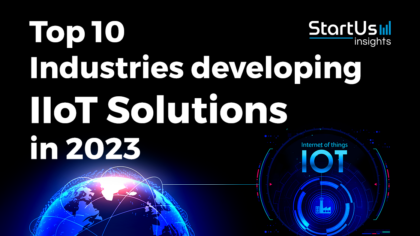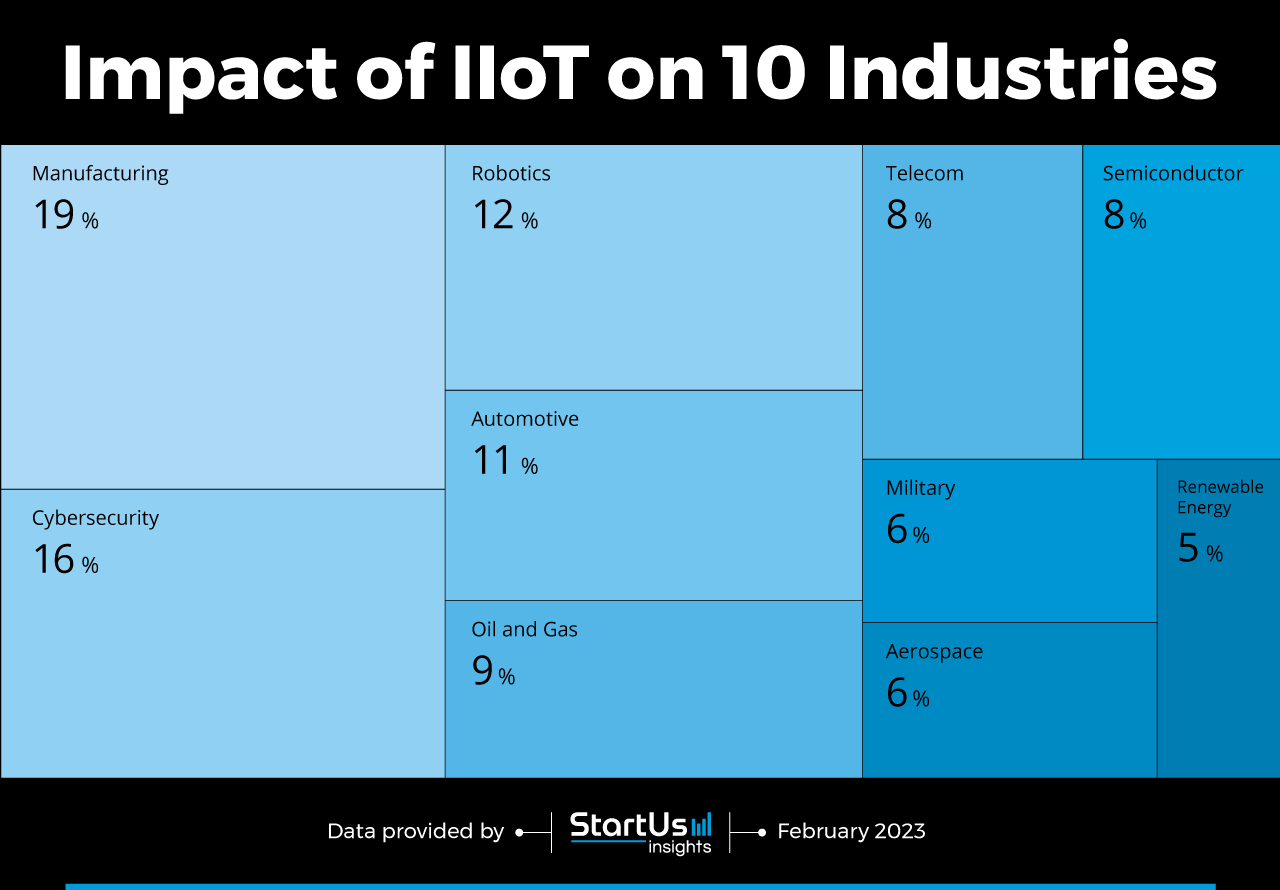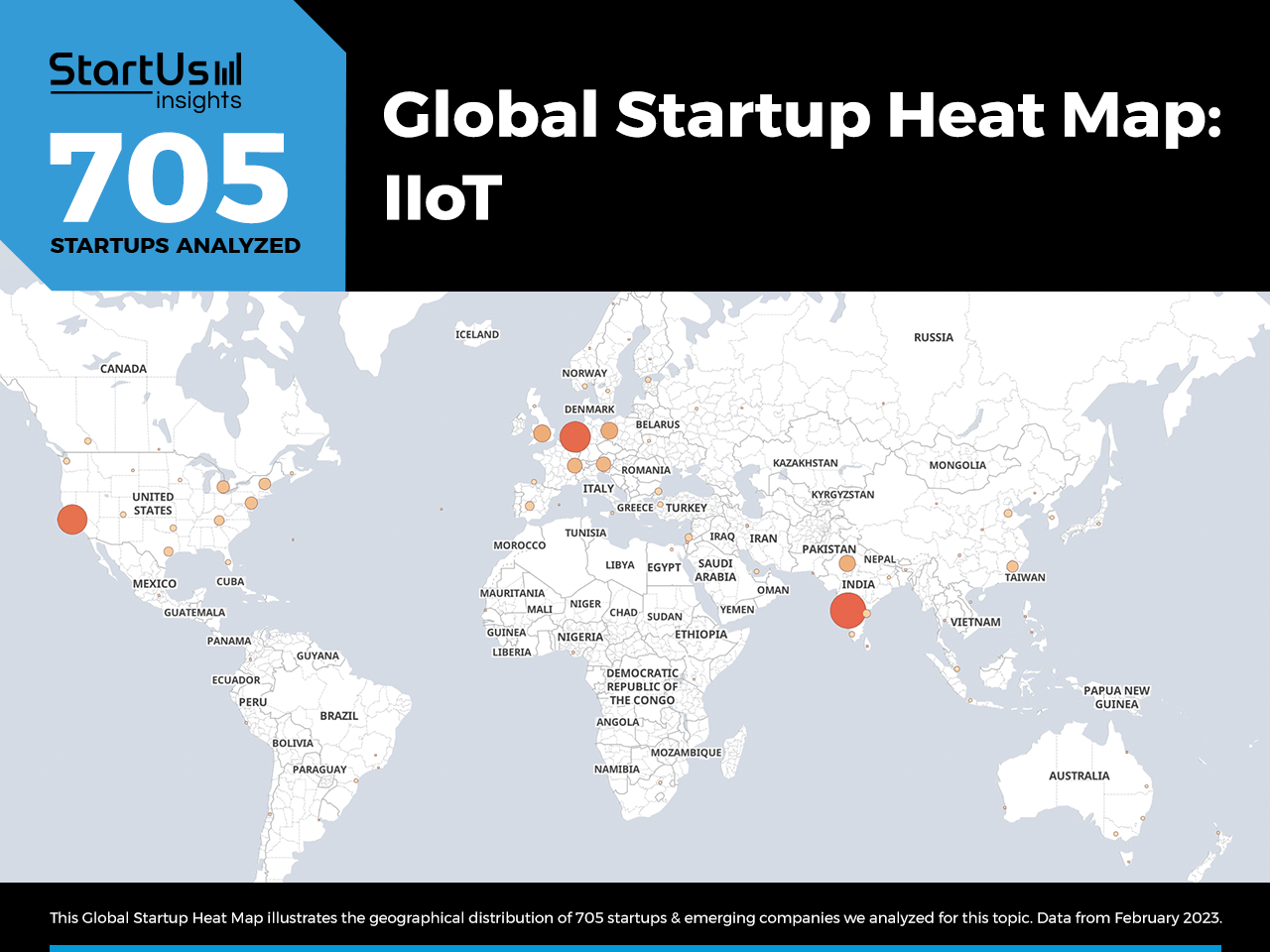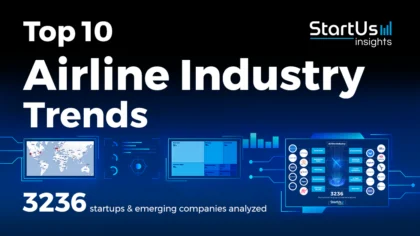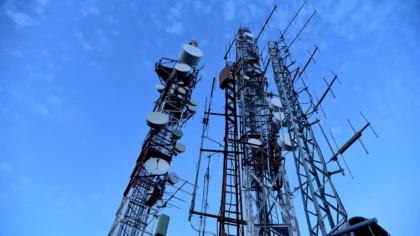The industrial internet of things (IIoT) aids asset monitoring, energy management, quality management, and more. These solutions find applications across industries, from manufacturing and robotics to military and renewable energy. In this data-driven report, we give you innovation insights based on our analysis of 705 IIoT startups & technologies so that you do not miss out on emerging solutions.
These IIoT applications allow you to leverage data-driven decision-making and find operational inefficiencies. Read more to explore the impact of IIoT on 10 industries and how they advance your business.
Tree Map reveals the Impact of IIoT Applications on 10 Industries
The Tree Map below illustrates the impact of IIoT on 10 industries in 2023 and 2024. The manufacturing sector utilizes IIoT to enable continuous asset and process monitoring, further powering predictive maintenance. Similarly, IIoT has similar use cases in automotive, oil and gas (O&G), semiconductor, and aerospace manufacturing.
However, IIoT security, telecom, and semiconductor industries are key enablers of the technology and the recent interest in IIoT greatly drives their operations. On the other hand, telecom and robotics solutions utilize IIoT to improve process monitoring and asset visibility. Lastly, IIoT improves situational awareness in military operations while enabling smart grid management for the renewable energy industry.
Global Startup Heat Map covers 705 IIoT Startups & Scaleups
The Global Startup Heat Map below highlights the global distribution of the 705 exemplary startups & scaleups that we analyzed for this research. Created through the StartUs Insights Discovery Platform that covers 3 790 000+ startups & scaleups globally, the Heat Map reveals that India has a high concentration of industrial IoT startups, followed by Western Europe.
Below, you get to meet 10 out of these 705 promising startups & scaleups as well as the solutions they develop. These 10 startups are hand-picked based on criteria such as founding year, location, funding raised & more. Depending on your specific needs, your top picks might look entirely different.
Impact of IIoT Applications on 10 Industries
1. Manufacturing
Digitization and automation of manufacturing operations require factories to integrate numerous data acquisition devices. That is why manufacturers utilize IIoT devices to collect granular data on asset conditions and manufacturing processes while ensuring minimal costs.
This data allows them to find machine and process inefficiencies as well as leverage data-driven decision support systems (DSS) using AI and machine learning. For example, applying predictive analytics on machine data enables floor managers to accurately forecast equipment issues, advancing predictive maintenance. Other applications of IIoT in manufacturing include worker and quality monitoring.
Imbrios Systems develops an Industrial IoT Board
Imbrios Systems is an Indian startup that makes LogSens, an industrial IoT board. It features various connectivity modules like WiFi, BlueTooth, and CAN bus for data logging and remote monitoring applications. The startup’s IoT board thus allows manufacturers to mitigate cost-intensive in-house product development and accelerate IoT integration. It finds applications in industrial control and automation, data acquisition systems, warehouse monitoring, and more.
2. Cybersecurity
The number of cyber attacks against IoT and IIoT devices is increasing as they are more prone to software and hardware vulnerabilities. Once malicious attackers gain access to internal networks through IIoT devices, they are able to quickly collect sensitive information or disrupt production. Cybersecurity businesses thus offer solutions tailored for IIoT devices.
They minimize access to operational technology (OT) and industrial control systems (ICS) to protect them from malicious hackers. Startups also develop continuous network and IIoT monitoring solutions to speed up threat detection and response. At the same time, security-first IIoT engineering makes IIoT devices more reliable and cyber attack resilient.
iotaBEAM offers IIoT Security
iotaBEAM is a US-based startup that develops StarDust, an IIoT security solution. It is a low-footprint software that leverages cryptography and a proprietary security protocol. StarDust mitigates custom software of hardware redesign and supports various processors and connectivity technologies like BlueTooth and WiFi. This allows industrial businesses to retrofit their endpoints, such as programmable logic control and SCADA systems, to protect IIoT devices at reduced costs.
3. Robotics
Robots require continuous monitoring of internal parts and external operations to efficiently perform tasks. Therefore, IIoT logically becomes a cost-effective and scalable means for robot developers and industrial companies to collect critical assets and process data. This also increases visibility into operations and allows businesses to identify discrepancies.
Additionally, IIoT improves machine-to-machine (M2M) and machine-to-human connectivity in industrial settings, ensuring worker safety. The internet of robotic things further improves the interoperability of various robots from different manufacturers.
Youibot Robotics makes Autonomous Mobile Robots (AMRs)
Youibot Robotics is a Chinese startup that creates a range of AMRs. The startup’s products include AMRs for conveyors, lifting, platforms, and inspection, among others. They connect to private networks to automate the movement of heavy loads and pallets between line-side stations or warehouses. The AMRs also feature rotating and lifting modules tailored for specific applications. This improves floor efficiency and system scalability while enhancing worker safety.
4. Automotive
Automotive original equipment manufacturers (OEMs) leverage IIoT to collect machine and worker-specific data to optimize factory floor operations. This data allows them to promptly identify operational inefficiencies and increase profits. For instance, monitoring painting finish in cars allows manufacturers to resolve any finish issues in real-time, avoiding reworks.
IIoT also enables auto companies to track individual parts and products from procurement and warehousing to assembly and final vehicle delivery stages. This improves visibility and enables real-time transparency into critical assets and processes.
Meta Smart Factory provides Automatic Dispatching Management
Meta Smart Factory is a Slovenian startup that automates dispatch management. The startup combines IIoT, a manufacturing execution system (MES), and business intelligence (BI) to track the movement of goods in real-time. Meta Smart Factory’s solution also creates receipts and production orders for raw material purchase orders to ensure material movement. This allows automotive manufacturers to avoid delivery and production delays as well as enables smart warehouses.
5. Oil & Gas
Oil and gas companies deal with numerous cases of capital loss and safety incidents due to pipeline leakage. This is often caused by a lack of continuous asset monitoring systems and planned maintenance. To tackle these issues, IIoT startups offer customized pipeline and other asset condition monitoring for O&G companies.
However, the application of IIoT expands over leak detection, allowing oil and gas businesses to track vehicles, manage tanker weights, monitor offshore sites, and control their carbon footprint. Since IIoT devices are now an integral part of O&G operations, businesses also focus on improving IIoT security to mitigate cyber attacks against OT systems and avoid associated downtimes.
Biz4Intellia facilitates Oil Well Monitoring
Biz4Intellia is a US-based startup that makes an oil well monitoring solution. It uses the startup’s connected sensors, meters, and IIoT gateways to track level and temperature. This data allows oil and gas companies to take preventive safety measures and mitigate the exposure of oil tankers or wells to flammable substances. The startup also develops a pipeline leakage detection solution. These solutions increase worker and general safety as well as save time and money.

6. Telecom
The telecom industry is one of the enablers of IIoT technology that offers the required connectivity infrastructure. At the same time, telecom operators and multi-service operators (MSOs) leverage connected devices to improve visibility into operations and increase productivity. For example, telcos deploy high-cost infrastructure at remote sites which makes on-site inspections difficult and expensive.
With IIoT, they are able to utilize continuous monitoring of such assets and infrastructure without incurring massive capital expenses. Telecom companies further use IIoT to monitor workers and ensure their safety as well as to track inventory and save energy.
4NG simplifies Telecom Monitoring & Control
4NG is a UK-based startup that makes SMARTset, a telecom monitoring, and control solution. It tracks external, internal, and battery temperature, heating, ventilation, and air conditioning (HVAC) system conditions, power consumption, and backup fuel levels. A configurable dashboard then provides insights into tower conditions, offering continuous, real-time equipment data.
Manufacturers are able to host SMARTset on-premise or cloud systems based on their preferences to enable predictive maintenance and receive early failure warnings.
7. Semiconductor
Semiconductor manufacturing utilizes high-precision and intricate processes to develop novel electronic devices and gadgets. Consequently, semiconductor fabs need to track and monitor the performance of the entire production line and machinery to minimize errors and ensure optimum throughput. IIoT offers chip manufacturers a cost-efficient and low-form factor solution to simplify asset and process monitoring.
The technology also enables predictive maintenance and reduces machinery energy consumption when combined with data processing solutions like AI or ML. Further, the semiconductor industry plays a critical role in ensuring the performance and accuracy of IIoT devices, thereby enabling edge IIoT, the artificial intelligence of things (AIoT), and more.
InPlay provides IIoT Chips
InPlay is a US-based startup that offers NanoBeacon, an IIoT system-on-chip (SoC) technology. It uses a circuit-integrated protocol to enable programming-free design and features a range of connectivity interfaces like I2C, ADC, GPIO, and more. This allows IIoT manufacturers to offer IIoT solutions at low costs while ensuring minimal power consumption and wider operating voltage ranges. InPlay’s SoC finds use in the manufacturing, healthcare, and retail industries.
8. Military
Kamikaze drones used in recent wars are an example of IIoT use cases in military operations. IIoT devices provide operation control and military personnel with real-time situational awareness that aids decision-making and greatly impacts mission success. Novel soldier assistance systems also offer this data through augmented reality (AR) displays.
Additionally, militaries use a range of wearable sensors, such as heart rate and pressure sensors to monitor and ensure the safety of personnel in the field. IIoT further finds applications in military and defense operations for vehicle fleet management, target recognition, and autonomous reconnaissance.
lvlAlpha makes an On-Field Cognitive Assessment System
lvlAlpha is an Indian startup that develops an on-field cognitive assessment system. It communicates health vitals, cranial impact trauma, and location details of on-field military personnel to mission control. The startup also offers a wireless patch and body sensor network to better monitor trauma during missions. This allows governments and military units to ensure personnel safety and avoid unintentional sabotage.
9. Aerospace
While data acquisition and asset tracking are the primary applications of IIoT across industries, they also impact aircraft design and engineering in the aerospace sector. Continuously monitoring aircraft body and control systems provides aerospace engineers with critical insights into their behavior, allowing behavior-based design.
At the manufacturing front, aerospace companies use IIoT devices to improve the traceability of parts and products across supply chains. It also enables them to monitor aircraft and manufacturing machinery health for data-driven maintenance planning and quickly identify quality issues. These functionalities ultimately enhance aircraft safety and production efficiency.
Mazlite manufactures a Spray Nozzle Sensor
Mazlite is a Canadian startup that creates a spray nozzle sensor. It uses direct imaging to capture and monitor multi-phase spray system data and offers feedback in real-time. The startup provides larger and smaller-scale versions of the sensor – DS5-400 and DS5-200 – for large sprays and test benches. This allows aerospace manufacturers to continuously monitor and improve painting processes as well as promptly detect nozzle malfunctions.
10. Renewable Energy
The intermittency of renewable energy sources greatly impacts the transition to a cleaner grid as it could break down conventional energy infrastructure. Therefore, continuous monitoring of energy production, weather, and energy consumption are all critical for smart grid management and in ensuring a stable clean grid.
IIoT devices allow renewable energy companies to efficiently and cost-effectively monitor these parameters and ensure optimum grid performance. Additionally, IIoT solutions enable the tracking of asset life leverage data-driven maintenance planning, and reduce grid downtime.
Bitlumens aids Energy Infrastructure Monitoring
Bitlumens is a Swiss startup that facilitates renewable energy infrastructure monitoring. The startup combines IoT and blockchain to provide data for power plant and utility system health. This allows energy operators and companies in off-grid communities to reduce theft costs while improving energy planning and power plant operations.
Discover All IIoT Applications, Technologies & Startups
IIoT developers are constantly trying to tackle processing bottlenecks and bring data processing closer to the data source. AIoT and edge IoT will make this possible and simplify the adoption of IIoT across industries. Moreover, startups are developing IIoT solutions from off-the-shelf components to make IIoT more affordable and scalable. While the security of IIoT devices is a major concern, advances in hardware and software design will further make them more resilient against cyber-attacks. Get in touch to identify specific IIoT startups & solutions that advance your business!
